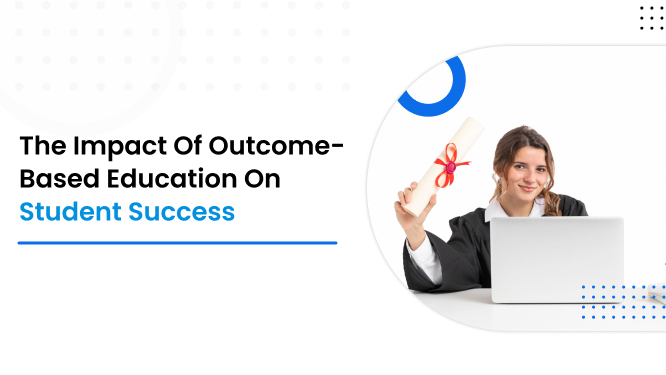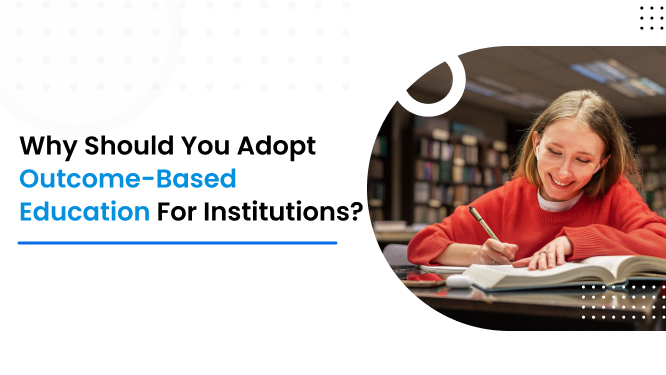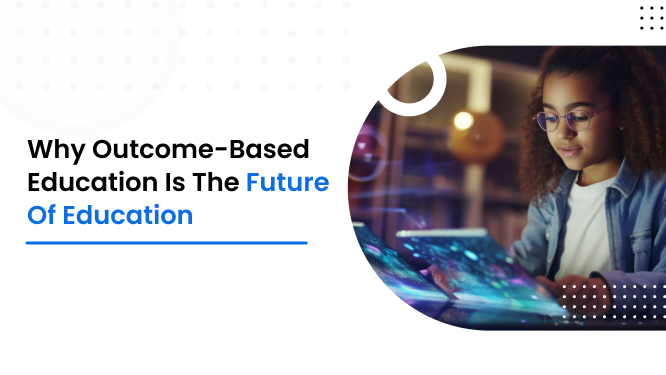The Impact of Outcome-Based Education on Student Success
Education is more than mere rote memorization of information.
It’s about the development of knowledge and skills within a student to tackle the challenges of an evolving world and succeed in life
With this intent in mind, Outcome-based education was brought into the world of learning.
As the name suggests, the Outcome-based education (OBE) method of learning is built around the idea of developing specific skills and achieving specific outcomes at the end of a learning program
In this blog, we will be learning,
- What is Outcome-Based Education?
- Advantages of OBE
- The Impact of OBE
- Overcoming OBE Challenges
So without any further delay, let’s start right away with,
Understanding Outcome-Based Education
Outcome-Based Education goes beyond traditional teaching methods. Instead of just focusing on transferring knowledge, OBE is all about what students can actually do, understand, and demonstrate.
Simply speaking, Outcome-based education is a method of teaching where instead of focusing only on transferring knowledge, achieving a specific outcome and developing a specific skill or knowledge in a student at the end of the program is prioritized.
Here's a closer look at its key principles:
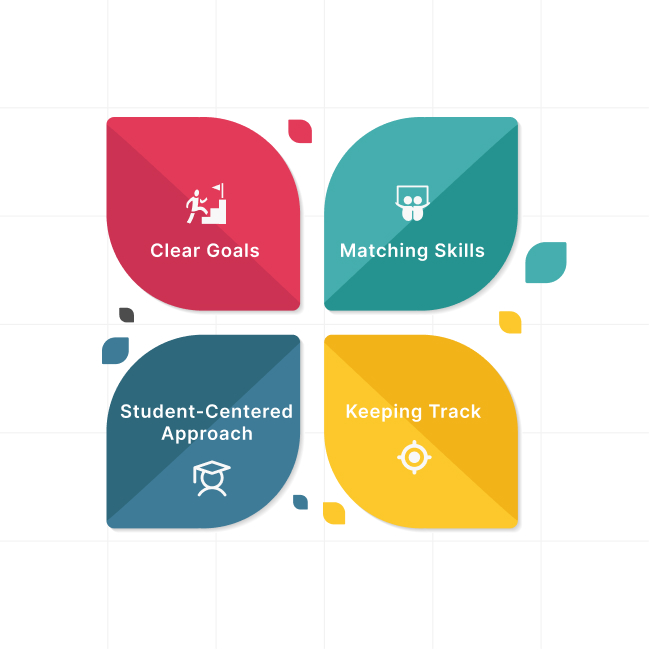
Clear Goals
OBE starts by setting explicit learning outcomes for each course or program. These outcomes act as guideposts, ensuring students acquire specific competencies.
Whether it's mastering a programming language or developing critical thinking skills, OBE lays the groundwork for purposeful learning.
Matching Skills
Unlike traditional education, OBE aligns educational goals with the practical skills demanded by employers and society. It ensures that what students learn is directly relevant to real-world needs.
This means students aren't just accumulating knowledge; they're gaining the tools necessary to excel in their chosen fields.
Keeping Track
Assessment is central to OBE. Regular evaluations measure student progress, inform instructional adjustments, and confirm the achievement of outcomes.
Whether through project-based assessments, portfolios, or performance tasks, OBE ensures that learning is an active and ongoing process.
Student-Centered Approach
OBE empowers students to take ownership of their learning journey. It encourages active engagement, participation, and a sense of responsibility.
With OBE, students become partners in their education, actively shaping their academic experiences and prospects.
Advantages of OBE
When it comes to benefits, Outcome-based education proves to be highly beneficial as compared to traditional learning methods.
Enhanced Learning Experience
OBE makes learning more engaging by promoting active participation, critical thinking, and problem-solving.
Students dive into tasks, projects, and assessments that directly relate to their future careers.
Whether they're simulating a business negotiation or designing a sustainable urban plan, OBE ensures relevance every step of the way.
Improved Employability
With a focus on practical skills and competencies, OBE prepares students for the demands of the job market. Employers highly value graduates who can apply their knowledge effectively.
Whether it's coding, communication, or teamwork, OBE equips students with the tools they need to stand out and succeed.
Personalized Learning Paths
OBE offers flexibility in learning paths, allowing students to tailor their education to their interests. They can choose electives, explore interdisciplinary topics, and shape their educational journey.
Whether delving into data science or pondering environmental ethics, OBE celebrates each student's unique path.
Clear Expectations
Defined outcomes in OBE ensure that students know what they need to achieve, while educators can monitor and support their progress effectively.
This transparency fosters accountability. Whether it's mastering a new language or refining leadership skills, OBE sets a clear standard for success.
The Impact of OBE
With such benefits, outcome-based education makes quite an impact on student success
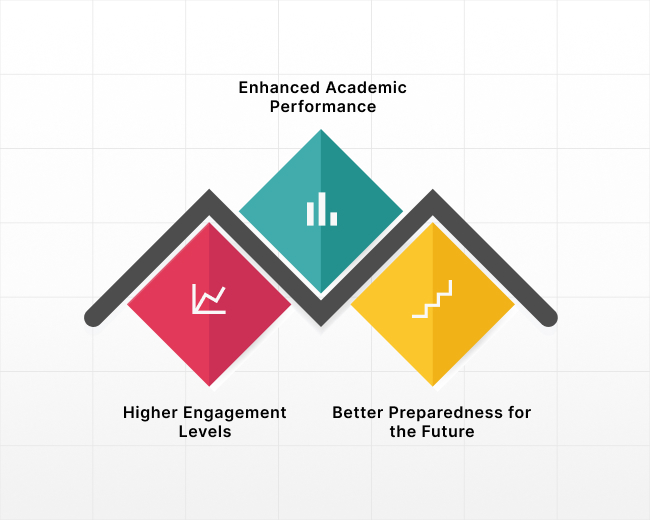
Enhanced Academic Performance
When students understand why they're studying a particular subject and how it connects to their future aspirations, they're more likely to be motivated and perform better academically.
Meaningful JourneyOutcome-Based Education (OBE) transforms the educational experience from a mere checklist of tasks to a meaningful journey of growth and development. Instead of just memorizing facts, students engage deeply with the material, knowing that it will shape their future endeavors.
Focused GoalsBy setting clear learning outcomes and aligning them with students' career aspirations, OBE provides a roadmap for success. Students can see the relevance of their studies and are driven to achieve their goals, leading to improved academic performance overall.
Higher Engagement Levels
OBE's emphasis on measurable outcomes keeps students focused and engaged. They understand what is expected of them and are motivated to achieve tangible results.
Practical ApplicationBy integrating real-world scenarios and practical tasks into the curriculum, OBE ensures that students see the direct relevance of their studies. Whether it's analyzing literature or conducting scientific experiments, students are actively involved in their learning process.
Active ParticipationOBE encourages students to take ownership of their education by actively participating in discussions, projects, and activities. This hands-on approach fosters deeper understanding and retention of knowledge.
Better Preparedness for the Future
OBE equips students with the skills and knowledge that are directly applicable to the demands of the modern workplace. Whether it's technical skills like coding or soft skills like communication and teamwork, graduates are well-prepared to succeed in their chosen fields.
AdaptabilityIn a rapidly changing world, adaptability is key to success. OBE instills in students the ability to think critically, solve problems creatively, and adapt to new situations with confidence.
Career ReadinessGraduates of OBE programs are not just academically qualified; they're also professionally prepared. Whether they're entering the workforce or pursuing further education, they have the skills, confidence, and mindset needed to thrive in their chosen careers.
Overcoming OBE Challenges
Despite the multitude of benefits and the impact of outcome-based education on student success, there are some challenges that must be addressed.
Complex Assessments
OBE aims to measure a wide range of learning outcomes, from practical skills to critical thinking abilities. Crafting assessments that accurately capture these diverse outcomes can be complex.
Educators must design assessments that go beyond traditional tests and truly reflect students' abilities across various domains.
Authentic Assessment
Traditional exams may not fully assess students' abilities to apply knowledge in real-world scenarios.
Therefore, educators need to explore alternative assessment methods such as project-based assessments, portfolios, and performance tasks.
These authentic assessments provide a more comprehensive view of students' capabilities.
Educator Readiness
Implementing OBE effectively requires educators to have the necessary knowledge and skills.
Many teachers may require additional training to understand the principles of OBE, design relevant learning experiences, and develop appropriate assessments.
Professional DevelopmentContinuous professional development programs are essential to support educators in transitioning to OBE.
Workshops, seminars, and mentoring can help teachers enhance their instructional strategies and assessment practices within the OBE framework.
Adaptation
Moving from traditional education models to OBE requires a cultural shift within educational institutions.
It necessitates a willingness and openness to change from all stakeholders, including administrators, teachers, students, and parents.
Change ManagementSuccessful implementation of OBE depends on effective change management strategies.
Institutions need to communicate the benefits of OBE, address concerns, and provide ongoing support to facilitate a smooth transition.
Collaboration and stakeholder engagement are crucial for overcoming resistance to change and fostering a culture of innovation.
End Note
Outcome-based education is an educational method of the new world, where the goal is the development of necessary skills and achieving outcomes of a learning program. It focuses on the outcome of learning programs rather than the mere transfer of knowledge.
Besides helping students gain the necessary knowledge, OBE also helps develop the right skills and mindset to apply and succeed in this technologically evolving competitive world.
